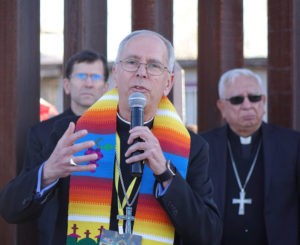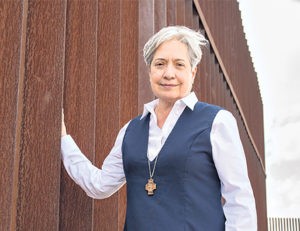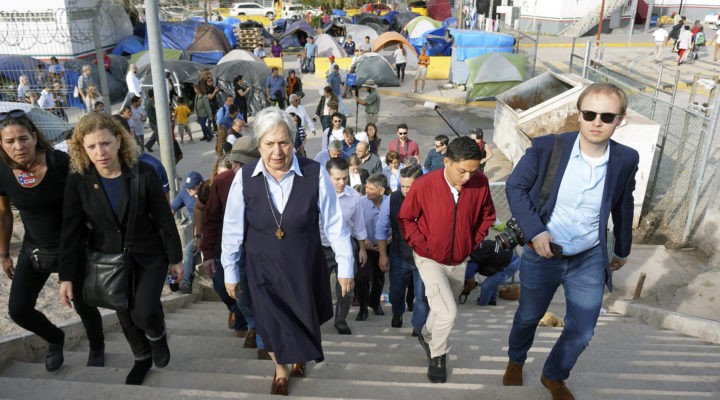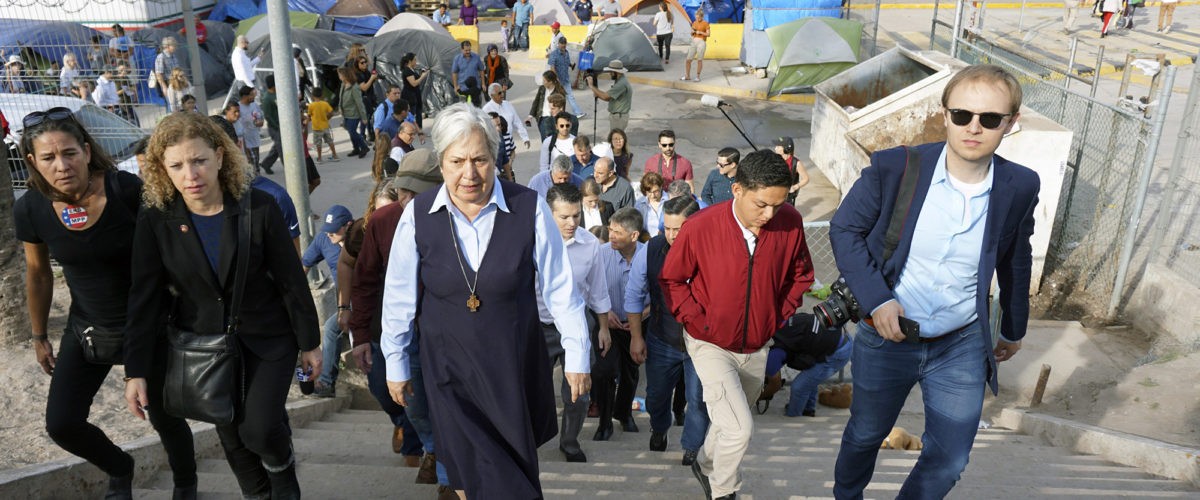Despite the well-publicized problems with a surge of migrants attempting to cross into the United States through the southern border, the Biden administration reports success on one related objective: Ending the controversial “remain in Mexico” policy of the Trump administration.
Three speakers — including two faith leaders — gave reporters an update April 22 on the end of the Migrant Protection Protocol of the Trump administration, popularly known as the “remain in Mexico” policy. The briefing was organized by the National Immigration Forum.
A White House official and two Catholic leaders deeply involved with migrant work at the border agreed that much progress has been made and that much more remains to be done. Just and when the next steps will roll out was identified as a top concern, with little future information provided by the White House.

Bishop Mark Seitz in 2019 at the border wall.
Mark Seitz, Catholic bishop of El Paso and a National Immigration Forum board member, called the Trump-era program, also known as MPP for short, “ill-conceived” and one that turned vulnerable migrants into “pawns on the chessboard of humanity, political pawns, really.”
He compared the Trump policy of rejecting asylum seekers at the border and forcing them to wait in Mexico for court dates — which often never came — to the actions of the priest and the Levite in the biblical parable of the Good Samaritan. “When we started sending people … back to danger … to communities that didn’t have the means to support them, we chose as a nation … to pass by on the other side of the road.”
Then he compared the policy to the actions of Pilate, who condemned Jesus to death by his unwillingness to get involved. The United States, Seitz said, sent vulnerable migrants “back across with no recourse and washed our hands of them.”
“It was really important that the (new) administration take quick and decisive action to end this program,” the bishop said.

Andrea Flores
Andrea Flores, national director for transborder security at the White House, reported that is exactly what the Biden administration has done.
“The wind-down of MPP is a model of the fair and orderly migrant processing the Biden administration is building on the southwest border,” she asserted. “It’s a model where border communities, faith community and NGOs are partners.”
In what is becoming a common refrain to explain the actions of the Biden administration, Flores said the immigration system was utterly broken by the Trump administration. “We inherited a system that was ill-equipped to handle vulnerable populations in a pandemic.”
From her perspective, the results the new administration already has achieved should be lauded, given what they inherited. The good news, she reported, is that since Feb. 19, 8,100 asylum seekers previously detained in Mexico by MPP have been processed into the United States, and others are being admitted every week.
“We have built a process,” she said, explaining that what began with three ports of entry now has expanded to six.
A top priority was to “safely process all those living in the Matamoros camp,” which has been completed, Flores said. Beyond emptying that notorious camp — a symbol of all that went wrong with MPP — delays in processing other MPP asylum seekers have arisen because of other pressing needs at the border, she added.
“We will continue to prioritize the most vulnerable populations who have been waiting the longest time.”
But others are still being processed every week, Flores said. “We have gone week by week according to processing capacity on both sides of the border. As the pandemic improves, you will see increased numbers at the six ports of entry. … We will continue to prioritize the most vulnerable populations who have been waiting the longest time.”
The processing of all asylum seekers who were detained by “remain in Mexico” could be accomplished over the next six to eight weeks, she said.
She urged the faith community, whom she called vital partners in the migrant work, to see this clearing of the Matamoros camp as a “first step” toward building “a real border management system.”
Bishop Seitz agreed that what he has seen happen in El Paso — where 3,000 of the MPP asylum seekers have been processed in the last two months — could indeed become a model for a better immigration system. But he quickly added that this is not enough because new asylum seekers currently are being turned away or sent back to Mexico — creating practically the same effect as the Trump policies.
“There is a population of vulnerable people … we continue to return to Mexico … every day,” he reported. “I’ve been on the other side of the bridge and seen the despair on their faces.”
“There is almost no way right now for people to access asylum, which is defined as a fundamental right for people,” Seitz said. “Right now, people aren’t even able to ask for that. They’re being sent back.”
“Safety and security are important, but our religious traditions call on us to expand our notions of security.”
The bishop acknowledged that the Biden administration faces “serious political headwinds and it’s very difficult to repair this terribly broken system overnight.” Yet the fact remains that the new administration “has had to adopt policies that carried over from the previous administration which were such terrible violations of human rights.”
Getting this fixed “will take courage to build a system that respects the rights of migrants and reforms our laws accordingly,” he said. “Safety and security are important, but our religious traditions call on us to expand our notions of security. Borders matter, yes, and we can think about borders in new ways. Borders are places that also can provide security to those who are the most vulnerable.”
He called on the Biden administration and faith leaders to “change the narrative away from fear and scarcity and toward a vision that sees migrants not as threats but as people with gifts that offer us an invitation to deeper solidarity.”

Sister Norma Pimentel (Photo: Catholic News Service)
Sister Norma Pimentel of Catholic Charities of the Rio Grande Valley also spoke on the press briefing.
“We’re very involved with those folks who were ‘remain in Mexico’ for two years or more. It was quite a triumph to humanity when all of them were able to cross over into the United States the last weekend in February and beginning of March. … Once they cross, we are ready to receive them and take them to our centers, where they are quickly connected with their families.”
She added: “We’re very happy with how it’s moving forward. I know there are lot of families still waiting. … We look forward to phase two.”
Reporters repeatedly asked Flores about the status of Title 42, a seldom-used provision of federal law that the Trump administration used to completely shut the border under the guise of responding to the coronavirus pandemic. Immigrant-rights advocates have roundly criticized this move as excessive.
Flores gave no clear answers to the question. “We are doing many hard operational planning tasks at once,” she said. “We will be humane, fair and orderly.”
Related articles:
Biden administration skewered for keeping Trump-era cap on refugee resettlement
Refugee resettlement expected to rebound, but the pipeline is broken
Biden plans to restore refugee admissions, but rebuilding the system will take time
As unaccompanied children surge across the border again, Baptist ministries retool
We cannot now close our border to those fleeing the horror we helped create | Opinion by Chris Conley


